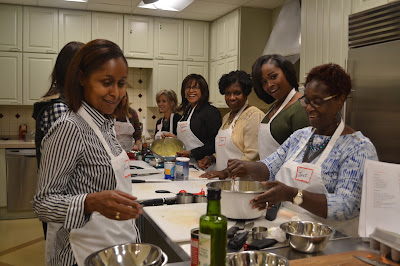 |
| Cooking Well class creates community |
Community is so important. As humans, we thrive on our innate ability to connect with those around us. We have evolved to find many ways to fulfil this need. We connect to others through culture, language, food, geographic boundaries, perceived norms, common interests and values, and health risks and conditions. Some go to church, others join book clubs, dance classes, walking groups. Some simply enjoy being amongst friends or peers in social settings, such as the grocery store or farmer’s market. As a future Registered Dietitian and current Graduate student in nutrition studies, I have learned to value the importance of having a community. When we feel supported, our own health, as well as that of the nation, is positively impacted.
 |
Caitlin Sloane,
Samford Dietetic Intern,
brought her extensive
culinary and nutrition
expertise to Cooking Well
during her rotation at CSM |
With this in mind, I have been honored and excited to spend these past few weeks working with Judy Vann at Christian Service Mission, as we bring together strong women in the community of Birmingham to cook, laugh, learn and eat together. At the Cooking Well Lessons, a 6-week series loosely stylized after the USDA Eat Healthy, Be Active program, individuals learn skills that will not only help them in the kitchen, but that will also help them to make healthier choices and think about their food culture differently. Lessons involve culinary tips, such as how to properly cut a red onion, as well as a 20-minute-long nutrition class. The hands-on cooking, as well as nutrition education, bolster each other in showing class attendees new and innovative ways to think about their food and health. I think I must have smiled for 3 hours straight, as I watched participants share food stories, life stories and troubleshoot the ins and outs of preparing a home cooked meal.
 |
| Allie Sanderson teaching culinary skills to everyone |
On week number 3, we made a colorful and vitamin packed Greek Panzanella salad, with several organic vegetables from the garden at Christian Service Mission. Sometimes, buying fruits and vegetables can seem too expensive. When you factor in the concept of purchasing organically, it can add a whole new level of stress! For this week’s nutrition education, I focused on sharing the “Clean 15 and Dirty Dozen” with Cooking Well participants. We learned that some fruits and vegetables such as cantaloupe and avocados do not need to be grown with pesticides, which can be toxic when eaten in large doses, and that others, including spinach and strawberries are best purchased organically because of their pesticide content.
As we made our way back to enjoy the lovely dinner we had prepared together, we felt more empowered. We gained new knowledge and insight into just one of the many ways that we can take charge of our health, for a happier and healthier community.
 |
| Caitlin chatting with the ladies from Bethel Baptist at dinner after class |




